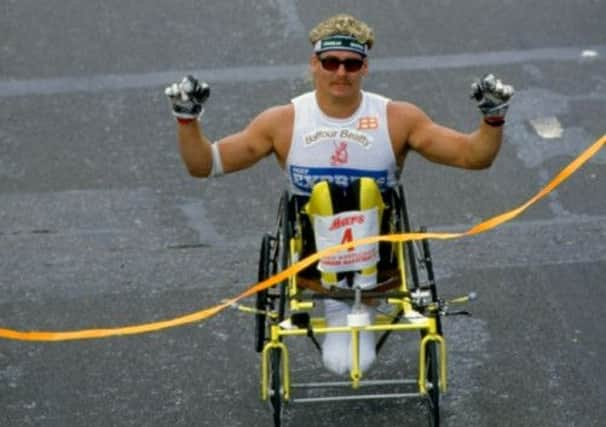Obituary: Chris Hallam MBE, disability sports pioneer


Chris Hallam’s death from cancer came as a shock to his many friends, even though they knew he had long suffered from the illness. For Hallam had proved almost indestructible in the past, bouncing back from injury and illness, including kidney disease, and he had bravely fought the lymphoma that was diagnosed in 2011 before succumbing last Friday.
Since then the tributes have poured in for a man who was a truly inspirational sporting figure, and a pioneer in UK disability sport, and particularly the Paralympics.
Advertisement
Hide AdAdvertisement
Hide AdThat word had not even been formally adopted when the 17-year-old Hallam sustained a fractured spine in a motorcycle accident.
He was left paralysed from the waist down, ending, so it was thought, his promising swimming career – he had already been told that he would be part of the Welsh national squad, and the accident took place two days before the official announcement was due.
Hallam was determined to get back in the pool, and within a relatively short space of time he became a multiple British record holder before winning the 50-metre breaststroke gold medal at the World Games for disabled athletes in 1982.
He then switched to wheelchair racing, which was beginning to get greater media coverage.
He borrowed the wheelchair of his friend and now fellow member of the Welsh Sports Hall of Fame, John Harris, and was soon hooked on the sport. Hallam then designed and built his own racing wheelchair, and began to compete over numerous distances.
After watching the original London Marathon Wheelchair Race in 1983, and inspired by the likes of first winner Gordon Perry and Ireland’s Kevin Breen – who lowered the course record by 41 minutes in 1984 – Hallam entered the 1985 marathon and knocked almost 19 minutes off Breen’s record to win in a time of 2 hrs 19 mins, 53 secs.
The following year he was hampered by illness and mechanical problems and lost the London race to Gerry O’Rourke of Ireland. In typical Hallam fashion, he trained harder than ever and won the 1987 London marathon in a new record time of 2hrs, 8 mins, 34 secs.
Hallam was always a distinct figure in his races, with his blond locks, bandana and sunglasses, from which he got his nicknames “Shades”. The impact of his wins in London were such that he became one of the first disabled athletes anywhere to attract sponsorship, and it is fair to say he enjoyed the media attention.
Advertisement
Hide AdAdvertisement
Hide AdIt was while at her home in Cardiff watching Hallam win the London Marathon that Baroness Tanni Grey-Thompson was inspired to take up wheelchair racing, going on to win the women’s race six times and set more than 30 world records.
Also in 1987, along with Harris – winner of the discus gold at the 1984 Paralympics – Hallam raised £25,000 by completing a 400-mile wheelchair push around the perimeter of Wales to raise money to build the Wales Sports Centre for the Disabled. A further £500,000 was raised and the building was erected.
From 1988, after the near- cancellation of the 1984 games, the Paralympics became very much part of the Olympic Games, with the host city organising them after the main Games. The official designation Paralympics was formally adopted, with competitors becoming Paralympians.
Hallam was selected for the Great Britain and Northern Ireland team for Seoul, South Korea, where he won bronze in the 400 metres. At Barcelona in 1992, Hallam again won a bronze medal, this time in the 100m. He had already been awarded the MBE for services to disability sport in 1988.
Hallam competed in the demonstration sport section in the Commonwealth Games in Auckland, New Zealand, in 1990 and was selected for Team Wales in the Commonwealth Games in Victoria, Canada, in 1994.
After retiring from competitive sport after the Atlanta Paralympics in 1996, and ten years after the first, with another “Push Around Wales” – this time covering 600 miles in 37 days – Hallam and Harris raised around £30,000 for disabled sport.
By this time, in 1997, Hallam was already suffering from serious kidney problems – Harris recalled him passing blood in his urine but refusing to give up the Push – and he had to undergo a transplant, the donor being his father John.
Latterly he lived in Penygarn in Pontypool, from where Hallam coached many other athletes with disabilities.
Advertisement
Hide AdAdvertisement
Hide AdHis place in the pantheon of Paralympians was secured by his pioneering ways in the early years of his career. As a direct influence on Baroness Grey-Thompson, he can be said to have encouraged greatness in others, too.
Chris Hallam is survived by his father John, mother Anne and sister June.